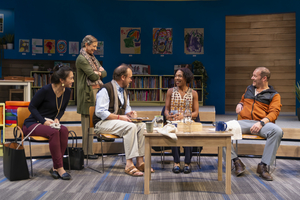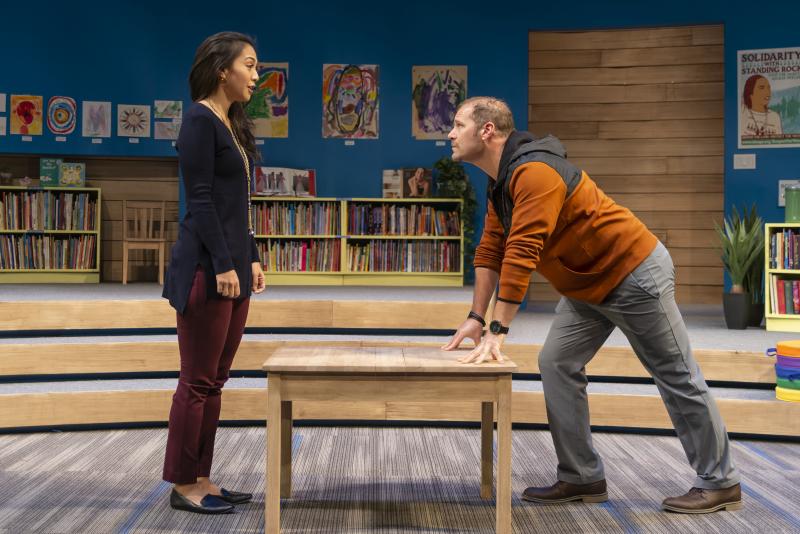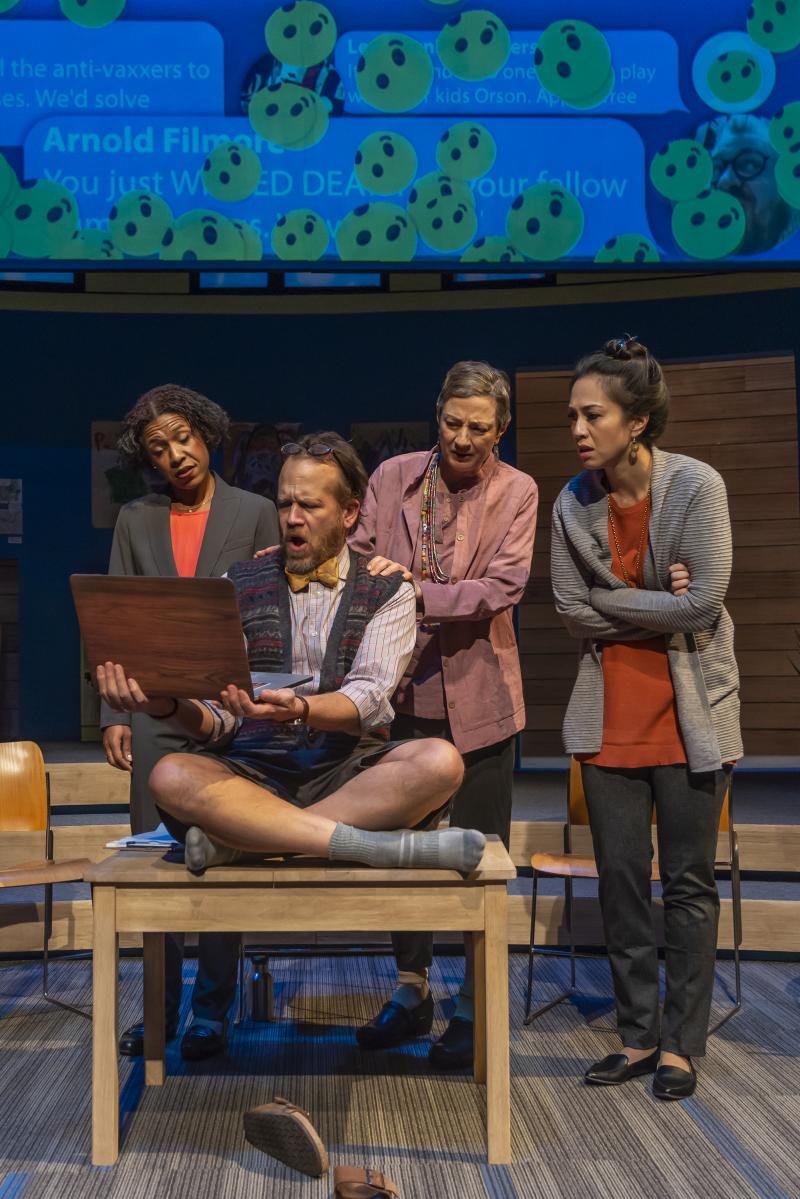Review: EUREKA DAY at Mosaic Theater Company

Everyone likes to believe that they're an open-minded, caring, thoughtful person who is considerate of others - and that in and of itself isn't necessarily a bad thing. After all, the world needs people who are compassionate, and it's certainly something we should all strive for. And yet, it's hard to deny that there are many people who grandstand on this ideal of goodness, presenting themselves as the most considerate in words, but often failing to follow through in their actions. These are the kind of people we see in the parents of the private school in Mosaic Theater Company's latest production, Eureka Day.
Eureka Day School is a private school based in Berkeley, California, that strives to create a welcoming, supportive environment for all students. While this is a noble attempt on paper, the reality is something much bleaker: a caricature of progressivism taken to an extreme. The show opens with parents debating whether to include another option on their already detailed list of ethnic identities. The new option in question, though, is ultimately deemed to be too specific and more connected to social upbringing rather than racial/ethnic identity, particularly when a previous request - to include a Jewish identity option for parents to select rather than white - was rejected on similar grounds. Through this one conversation, the audience is given an immediate insight into the characters who comprise Eureka Day's advisory board: Suzanne, the domineering president of the board who projects an aura of love and inclusion with her loose clothes, piercings, and warm voice even as she actively reinterprets others' words to suit her needs; Eli, the stay-at-home dad who considers himself incredibly progressive and respectful but can't quite stop himself from cutting off the others in the group regularly; Meiko, the single mother who generally fits into the community, but also has some doubts about her choices; Don, the Birkenstock-wearing peacemaker head of the school, who genuinely supports the ideals of the institution but seems laughably oblivious to any of the related absurdities; and Carina, the newest member of the board, who stands out from the others in her conservative suits and blatant skepticism, as well as her unique background (her son, to the others' shock, previously attended public school). When an outbreak of the mumps turns the school into a quarantine zone, the board's issues are brought to a head as they are forced to confront how to make decisions that are inclusive as well as practical, and how to resolve issues when a consensus isn't possible.
The cast is a strong one, though they occasionally seemed to struggle with the script, which might be more of a material than a skill issue. Lise Bruneau's Suzanne was presented perfectly - her friendly demeanor countered by her steamrolling anyone who objected to her views about "her" school (as she finally slipped and admitted) was entertaining, and it was enjoyable to increasingly dislike her character's controlling nature and false prosestrations of inclusion. Elan Zafir's Eli was initially bombastic and domineering, but his grief for his child shifted the character in a way that made Zafir's performance compelling and touching. Don, as portrayed by Sam Lunay, was played with such unaffected joy that he was honestly the most likable character in the show; despite his crunchy presentation and reliance on useless mediation methods (like lists of common interests that obstinately ignored any details that would complicate things), his sole focus was on the school's interest, and, by extension, the students, and he seemed to genuinely embody the values of the school and community.

Carina serves as the audience's main rational window into this weird world, and Erica Chamblee is a perfect guide - her unamused expressions and skepticism made her the ideal foil to the more caricature-like characters, and it was easy to root for her when she and Suzanne finally came to blows. But it's Regina Aquino's Meiko who truly stands out in this performance. Meiko's descent from self-assuredness to guilt and doubt is heartbreaking to watch, and even Aquino's background moments (such as when she decides to eat one of the scones Carina brings to a meeting) are genuinely funny and enjoyable to watch.
(Note: I cannot comment on the last actors in the cast, who alternate playing a role in the final scene, as the opening performance was instead graced with the presence of Congresswoman Eleanor Holmes Norton, which was a delightful surprise. Mosaic has confirmed that there will be a number of cameos in this role throughout the show's run.)

The production side of Eureka Day is definitely the strongest aspect of the show. Serge Seiden guides the characters through their crises with a deft hand, and the virtual "Community Activated Conversation" (Eureka Day-speak for "town hall") is genuinely hilarious to watch unfold. The controlled chaos as multiple fights break out on stage and screen was delightful and relatable, and was one of the best reflections of reality I've seen on stage. The projections provided by Dylan Uremovich and Theodore J. H. Hulsker were particularly spot-on and amusing. Andrew Cohen's set is notably wonderful - the classroom was carefully designed to include various school projects, fun posters, and child-geared seating. The walls had a bit of stick to them, allowing Don to paste up notes during a meeting, which was a smart detail, and the windows at the top of the set were beautifully constructed to give the appearance of outside light. I also want to be sure I note that the books on stage were all donated to Mosaic, and will in turn be donated to DC Public Schools following the performance run.

Despite the show's strengths, there are definitely a few weak points in the script that need to be acknowledged. Although the show makes a number of references to the (false) idea that vaccines cause Autism (again, they do not), this particular argument not only went unchallenged on its veracity, but the ableist argument that people would rather see their children dead than Autistic was never addressed. Furthermore, in an attempt to show the gap between the enlightened language and the actual attitudes professed, a number of passing anti-Semetic remarks were made by characters throughout the performance; although the audience certainly reacted and seemed to understand the disconnect, it was more than a little frustrating to see other attitudes confronted while this entire running commentary was left unacknowledged. These concerns were compounded by the show's attempts to be as progressive as its characters professed to be, particularly in the platform given to the anti-vaxx movement. Although the show ultimately points out where the science lays and the dangers of the loss of herd immunity, and generally advocates for following the advice of doctors, it still gave a fairly unchallenged platform to a good number of anti-vaxx arguments, relying more heavily on the idea that the community should take priority over any concerns, without addressing the validity (or lack thereof) of those concerns.
The show's attempt to lambast the extreme left is also a bit clumsy - while there are fair points to be made about disingenuous performances of progressivism and about extremism in general, it did occasionally feel like the show was an attempt to shame PC-culture without acknowledging that some political correctness is valid and warranted; I was incredibly self-conscious commenting on the anti-Semitism and ableism in the show to my companion because I was aware that I sounded too much like the characters on stage, even though I knew my concerns were far from shallow or performative. These conversations are important, and, while they've certainly been brought to absurd degrees in some cases, it doesn't mean the underlying arguments themselves are by any means invalid. Inclusion is important, and it shouldn't be dismissed out of hand just because some ideas (such as anti-vaxxing, flat-earth theories, and Creationism) are undeserving of equal weight. The fact that the show struggles to denounce anti-vaxx conspiracy theories without also dismissing genuine inclusion concerns out of hand is its fatal flaw.
That all said, Eureka Day is still a fun show. I certainly laughed, and enjoyed the performance. But I also had a lingering distaste from its heavy-handed, clumsy messaging.
Mosaic Theater Company's Eureka Day plays at the Atlas Performing Arts Center through January 5, 2020. Run time is approximately two hours with one fifteen-minute intermission. Information on tickets, show talkbacks, and accessibility can be found on the Mosaic website.
Photos courtesy of Christopher Banks.
Reader Reviews

Videos

